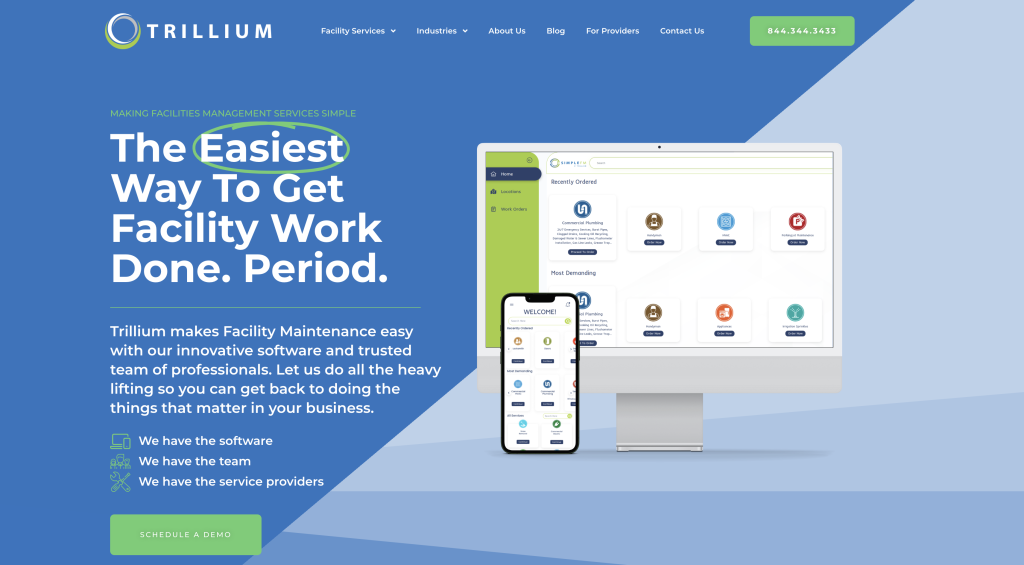Recurring maintenance delays, missed vendor calls, and rising costs signal that your current system might not be working.
When your team spends more time fixing problems than preventing them, productivity takes a hit. Outsourced facilities management helps businesses regain control by improving service coverage, speeding up response times, and freeing internal resources.
This article outlines nine reasons companies outsource before small issues become larger disruptions.
What Is Outsourced Facilities Management and Who Uses It?
Outsourced facilities management brings in outside professionals to handle the daily responsibilities that keep buildings functional. This includes maintenance, cleaning, repairs, and specialized support across multiple trades.
Instead of relying only on internal teams, businesses work with a service provider to manage tasks like HVAC, plumbing, and janitorial services. This model allows companies to bring in support as needed without hiring full-time staff or paying inflated hourly rates.
Who Uses This Model?
You’ll see this model across different industries:
- Retail chains use outside help to manage locations across several regions.
- Manufacturing companies bring in experts to handle complex equipment repairs and predictive maintenance.
- Food service brands need reliable janitorial services to meet safety standards.
- Property managers work with facility management (FM) providers to streamline maintenance across their portfolios.
Small and midsize businesses also benefit. Many use outsourced support to fill skill gaps, manage growing workloads, or reduce costs when scaling.
Organizations that once handled everything in-house now prioritize smarter service provision. They want flexibility, lower operating costs, and access to tools that improve service quality.
Why You Should Consider Outsourcing Facility Management
If you’re unsure whether outsourcing is the right move, it helps to look at what’s slowing your team down. These nine reasons come straight from the day-to-day issues facility managers deal with.
1. Managing Internal Teams Is Draining Time and Cost Savings
Hiring, training, and managing a full in-house team takes time. If your crew spends more energy scheduling contractors, chasing updates, or managing repetitive tasks than solving problems, you’re losing productivity.
Labor costs add up fast. You cover wages, benefits, insurance, and downtime. When your team isn’t working at full capacity, the company still pays the bill. That slows down your ability to hit bigger business goals.
Outsourcing gives you the flexibility to bring in support when needed without committing to full-time roles or long-term overhead. This method lets your existing staff focus on core business functions.
Managing your facilities shouldn’t feel like babysitting. If your team spends more time coordinating service than executing it, it’s time to reassess.
2. Reactive Service Requests Are Piling Up
If your team waits until something breaks to fix it, you’re already behind. Delayed repairs lead to longer downtime, higher repair costs, and frustrated employees or tenants.
Without a reliable process, important tickets get missed. Equipment stays offline longer, and people stop reporting issues because nothing gets done.
An outsourced team responds faster and keeps requests moving. They handle incoming tickets, dispatch the right technicians, and close out jobs without pulling your staff away from higher-priority work.
When service requests start stacking up, outsourcing helps you clear the backlog and keep building maintenance on track.
With consistent support, you improve service delivery and strengthen trust across departments.
3. Skipping Preventive and Predictive Maintenance Is Costing You
When no one has time to inspect equipment or schedule regular upkeep, small issues turn into major repairs. Skipping preventive maintenance shortens equipment life and increases downtime.
Internal teams often focus on immediate problems. Preventive tasks drop to the bottom of the list, especially when the team is understaffed or overwhelmed.
An outsourced provider takes ownership of these routines. They use data collected from past jobs and inspections to schedule services that prevent breakdowns.
These tasks directly support employee well-being by maintaining safe, comfortable, and fully functional spaces.
4. You Lack Visibility Across Locations
Managing multiple sites without clear tracking makes it nearly impossible to stay organized. If you rely on spreadsheets or email threads to monitor repairs and dispatches, you’re always guessing which work got done, how much it cost, and who handled it.
This lack of visibility slows down decision-making. It’s harder to prioritize repairs, compare vendor performance, or understand how much you’re spending at each site.
Outsourcing solves this with better tools. Many providers use a computerized maintenance management system to track every request, vendor visit, and invoice in one place.
That means you can log in and instantly see open jobs, overdue tasks, and completed work, no matter how many locations you manage.
If visibility and tracking are ongoing challenges, outsourced facilities management offers a more structured, tech-enabled way to keep everything on track.
5. Your Technology Isn’t Keeping Up
Outdated tools slow everything down. If your team still relies on paper logs, manual approvals, or legacy systems, you’re wasting time on tasks that should take seconds.
Slow tools lead to slower service. Vendors wait for approvals, team members miss updates, and small issues get overlooked. Meanwhile, your internal staff loses hours each week handling what could easily be automated.
Outsourcing gives you access to advanced technology without the upfront investment. Many providers offer tools that streamline work orders, scheduling, approvals, and reporting. You get real-time visibility and fewer manual steps, without building a custom system from scratch.
Some partners also integrate with Internet of Things (IoT) devices, helping monitor equipment in real time and alerting your team before problems escalate.
6. The Business Is Growing Faster Than Your Team Can Handle
Growth should feel exciting, not overwhelming. But when new locations open and headcount stays the same, facility tasks pile up. Your team can’t be everywhere at once, and gaps in coverage start to show.
Expanding buildings, fleets, or services without a support plan leads to delays and burnout. What worked for five properties might fall apart when you hit fifteen.
Outsourcing helps you scale operations without overloading your staff. You can add coverage in new regions, increase service frequency, or bring in specialists without long hiring cycles.
This kind of flexibility is shaping the total facilities management market, as more businesses rethink how they structure facility support in high-growth phases.
7. Your Service Provider Gaps Are Slowing You Down
Quality technicians are hard to find and even harder to retain. As experienced workers leave the industry and fewer people enter the trades, staffing gaps become a real problem.
Even with a reliable team, not every task is covered. Some jobs require specialized expertise that your staff may not have. Delays follow, and critical work goes unfinished.
Outsourcing gives you access to certified professionals across multiple trades. Leading FM services come with clear service level agreements, so you know exactly who’s doing the work, when they’ll arrive, and what results to expect.
This support keeps FM duties running smoothly and consistently, even across distributed teams.
8. Compliance and Risk Management Are Falling Behind
Missed inspections and outdated records can lead to fines, safety issues, or failed audits. When your team juggles too many tasks, compliance often gets pushed aside.
Tracking regulations, maintaining reports, and staying updated on building codes are essential FM functions, but they require time and focus. Internal teams already stretched with daily maintenance rarely have room to manage it all.
Outsourcing is helpful for the following functions: safety checks, inspection scheduling, code compliance, and documentation management.
This kind of support also strengthens change management. As new rules or operational shifts come up, experienced providers help your business adapt without delays or confusion.
It also promotes energy efficiency by making sure systems run correctly and maintenance happens on time.
9. Your Team Needs to Focus on Strategy, Not Coordination
Facilities teams spend too much time chasing updates, rescheduling missed visits, and answering vendor emails. When every day turns into task juggling, bigger priorities get pushed aside.
Your staff should focus on planning, budgeting, and improving performance, not micromanaging maintenance calls.
Outsourcing handles the back and forth. A reliable partner manages dispatching, job tracking, and follow-ups. With the right tools, you can automate repetitive tasks and reclaim time for strategic work.
This shift improves operational efficiency, reduces stress, and gives your team a competitive advantage by letting them focus on strategic planning instead of day-to-day vendor management.
Switch to Trillium and Simplify Maintenance Across Every Location

Trillium helps facility managers simplify repairs, dispatch vendors faster, and take control of service tracking, without long-term commitments. It supports efficient building maintenance while giving you more time to focus on critical business processes like compliance, budgeting, and asset planning.
Trillium replaces manual follow-ups with smart automation and provides access to 6,000+ vetted professionals across 58 trades. Whether you’re managing HVAC issues, landscaping, or space management, everything is logged, tracked, and visible in one place.
You’ll get:
- No software fees
- No contracts or minimum work order volumes
- Live support from real people, 24/7
- Nationwide coverage across 47 states
- Full pricing transparency and real-time status updates
Built for flexible FM operations, Trillium helps teams scale without adding complexity. As organizations modernize their systems for the next decade, Trillium offers a streamlined way to improve service delivery and reduce admin overhead.
Start using a platform that works on your terms, supports your team, and keeps facilities running without the stress.
Try Trillium for free and see how simple facility management can be.
FAQs About Outsourced Facilities Management
What is outsourced facility management?
Outsourced facility management means working with a third-party company to handle the maintenance, repair, and support tasks that keep your buildings running. These companies deliver a range of facilities management services, from routine upkeep to emergency repairs, depending on your needs.
They also help optimize space utilization, making better use of available square footage and reducing waste across locations.
What are outsourcing facilities?
Outsourcing facilities refers to the physical buildings or systems managed by an external provider. This includes everything from HVAC systems and janitorial work to landscaping, energy usage tracking, and asset upkeep.
What are the advantages and disadvantages of outsourcing facilities management?
Outsourcing offers flexible service offerings, access to skilled technicians, and fewer staffing headaches. It also allows internal teams to focus on core operations instead of daily maintenance.
What’s the downside? You may need to give up some control over how tasks get done. That’s why it’s important to set clear expectations and stick to well-defined service level agreements.
Under what circumstances would it be advisable to outsource facility management functions?
Outsourcing makes sense when your team is overloaded, your tools can’t keep up, or you’re expanding across locations. It’s also useful when tasks like project management, safety checks, or vendor coordination start to pull attention away from strategic work.
In the long run, outsourcing helps reduce stress on your staff while improving consistency, compliance, and accountability.









